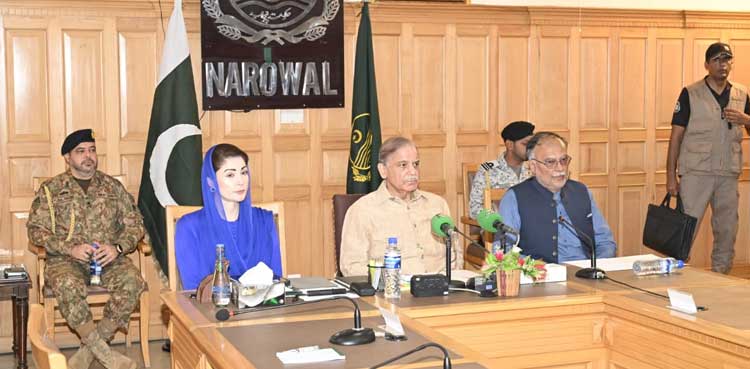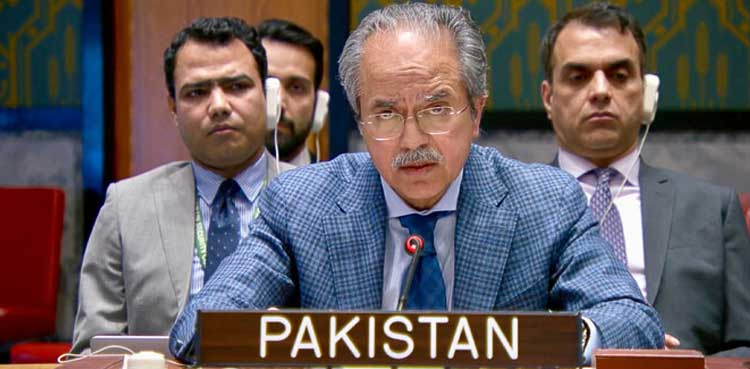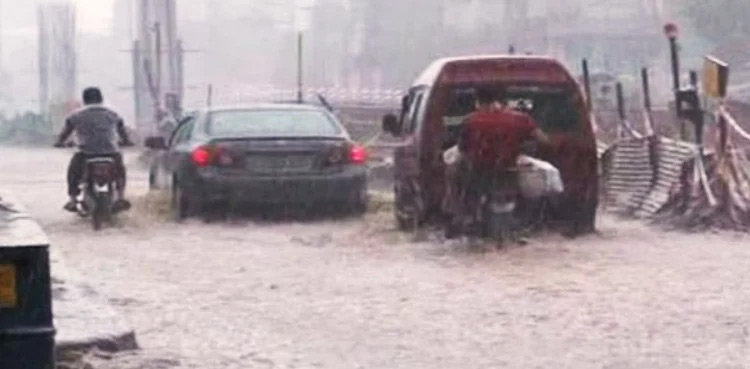NAROWAL: Prime Minister Shehbaz Sharif on Thursday stressed the urgent need to expand Pakistan’s water storage infrastructure to mitigate the impact of devastating flash floods, warning that such disasters are likely to recur in the coming years due to climate change.
Chairing a high-level meeting to review the flood situation, the prime minister said enhancing storage capacity was critical and urged immediate action. “Storage capacity is the need of the hour, and without wasting any more time, we should start work in this regard,” he emphasized.
Shehbaz Sharif stressing the importance of generating resources to fund the construction of dams and water reservoirs nationwide, said “we will have to generate the resources by ourselves”.
Shehbaz Sharif added that projects like the Diamer-Bhasha Dam must be completed without delay.
The premier noted that while floods initially hit northern areas, they were now wreaking havoc in Punjab’s plains. He expressed condolences for those who lost their lives and lauded the coordinated rescue and relief efforts of Punjab Chief Minister Maryam Nawaz Sharif, the National Disaster Management Authority (NDMA), Pakistan Army, and civil departments.
Recalling the devastating 2022 floods in Sindh and Balochistan, Shehbaz warned that Pakistan remains among the top ten most climate-vulnerable countries, resulting such disasters likely to recur in coming years.
He called for short-, medium-, and long-term strategies to strengthen disaster preparedness and response.
Chief Minister Maryam Nawaz expressed deep sorrow over the loss of lives, crops, and infrastructure but stressed that no deaths occurred due to negligence. She praised NDMA, PDMA, police, civil defense, and the army for rescuing over 50,000 people, ensuring timely evacuations, and minimizing livestock losses through early warning systems.
With parts of the Gurdwara submerged, Maryam directed authorities to drain floodwater urgently. She also ordered activation of field hospitals, deployment of 1,000 mobile clinics, and sufficient vaccine supplies, prioritizing vulnerable groups such as women, children, and the elderly.
She said around 200 km of roads had been damaged and ordered immediate restoration of temporary routes to maintain connectivity, while also stressing long-term rehabilitation and infrastructure to maximize water storage and minimize wastage.
Read More: Raging riverine flooding claims at least 25 lives in Punjab
Federal Planning Minister Ahsan Iqbal highlighted climate change as a pressing but manageable challenge if gaps in disaster response were addressed. He noted that unlike Pakistan, neighboring India suffered less damage due to stronger infrastructure.
Iqbal warned that village connectivity had been severely disrupted, requiring bulldozers and heavy machinery to restore access and medical coverage. He emphasized rehabilitation efforts, urging agriculture banks to provide concessional loans to flood-affected farmers to help them rebuild and achieve self-reliance.
Earlier, NDMA Chairman Lt. Gen. Inam Haider briefed the meeting on the overall flood situation in Punjab.










